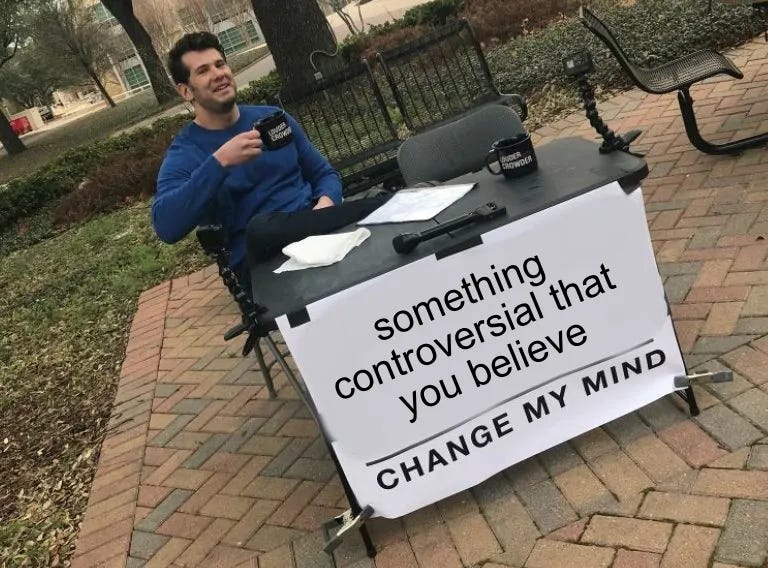We should return to healthy debate
College campuses should be places ideas are tested, not safe spaces to never encounter anything outside consensus
When I was on college campus not too long ago, before the ‘great awokening,’ all sorts of different people and groups in public, outdoor areas came to debate things with students. All were peaceful, even if occasionally provocative. It was a chance to debate things with those who thought differently and engage in social experiments. Maybe some felt differently, but I remember it fondly as someone who enjoys sparring with people verbally, of course with respect. Even (especially) if I didn’t agree.
Now, people see these things and all too frequently tell them to leave, yell obscenities, or start to engage and simply walk away when pressed with the slightest challenge to their beliefs.
This phenomenon, visible in man on the street YouTube videos, seems to function less as a rhetorical strategy and more as an existential one. It’s the modern escape hatch from the burden of being intellectually present. The interviewer, often an unthreatening looking guy with a mic and a vaguely libertarian air, asks something simple: "What do you mean by that?" or "Can you give an example?" And like some kind of ideological Scooby-Doo trap, that question alone causes the activist to shuffle awkwardly, look at the ground, and exit stage left.
There’s examples of this I see shared all the time, more than enough for it to be a trend. Here’s one particularly illustrative video in Portland, where people don’t even like the idea of a professor running a simple thought experiment on campus: activists scream profanity at him from a rooftop and eventually walk down to speak with him. After a lengthy discussion, it becomes apparent they didn’t come down to debate or learn, they simply want the experiment shut down. It’s emblematic of so much.
Put the topic of the above video aside no matter how you feel about it. No of this is civil, or debate. It’s debate-shaped absence. The activists don’t lose the argument, they just leave the possibility of argument entirely by lecturing someone who actually studies this subject because they don’t like his experiment. And this, it seems, is the preferred method of engagement for many: don’t rebut or listen, just push your ideology and try to cancel things you don’t like.
The reasons for this aren’t hard to guess. We live in the age of curated selves, where beliefs are performative and disagreement is seen as a personal attack rather than an invitation to sharpen one’s thinking. When your ideology is fused to identity, defending a position feels like defending a fragile sense of you, and any question becomes a form of violence. Better to retreat than risk cognitive dissonance.
The postmodern quirk here is that this is all happening in public and shared online. But something deeper is rotting. Debate used to be a sign of respect. It meant someone took your ideas seriously enough to challenge them, to test their tensile strength. Now, the challenge is interpreted as disrespect. “You’re not listening” is code for “you’re not agreeing,” and “I don’t feel safe” is the ejector seat phrase for the intellectually unprepared.
Walking away or trying to cancel someone is, paradoxically, both a flex and a flinch. It’s a signal they think says I don’t need to engage with you, but what it really means is I don’t know how to, or I can’t present an argument.
And maybe this is the real lesson to teach on the quad: that not every question is a trap, not every opponent is a villain, and not every challenge is a trauma. As I mentioned at the start of this post, we had these same people on campus when I was in school and it was seen as a fun challenge to debate them. No one felt unsafe. These people aren’t going to physically harm anyone online or off.
The bravest thing you can do isn’t to scream or flee.
It’s to stay, and think. To discuss calmly. You of course don’t have to agree.
If students can’t do this in college, a time they should be thoughtful enough to hear perspectives of others, what hope do they have as they enter the real world?




I'm not sure most people really know WHY they believe what they claim to believe, especially not most college kids, so these interactions seems to exist just to make the interviewer look cool in a lot of cases. "Healthy debate" has historically probably been more an outlier than the norm.
This reminds me of the time I saw a video of college kids eagerly signing up to protest against “dihydrogen oxide.” (A clever name for water).